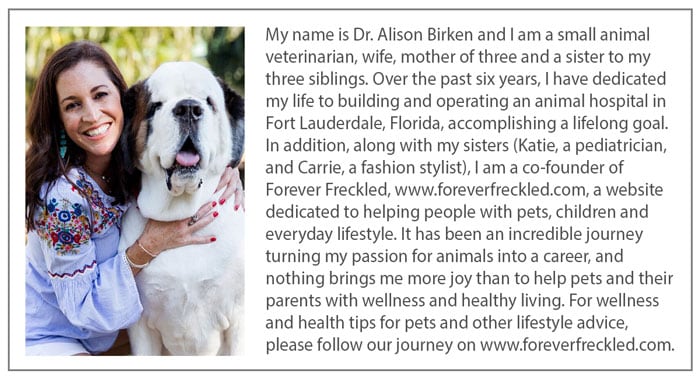Contributed by Dr. Alison Birken, owner and DVM of Victoria Park Animal Hospital.
Did you know that the top most allergenic foods for dogs and cats are chicken and beef? As a small animal veterinarian, I commonly see second opinions for a food allergy that has been misdiagnosed and overlooked. It is sometimes hard to “digest” that pets could be allergic to chicken or beef, as these are the two most popular proteins in pet foods. I spend a lot of my time informing my clients about cat and dog food allergies and how to determine if your pet is suffering from a food allergy. The topic of food allergies in cats and dogs is a bit confusing due to the overwhelming amount of information out there on the Internet. While some of it is truthful and may be helpful for your pet, other times it is misguided and may send you down the wrong path for treatment. So today I would like to take a moment to discuss food allergy in pets and how it very may be possible that your pet is allergic to a common protein.
What Is a Pet Food Allergy?
There are two different types of adverse reactions to food: a hypersensitivity reaction and intolerance. A hypersensitivity reaction involves the body’s immune system, which produces a reaction when exposed to an allergen over time. Food intolerance can occur with the first exposure to food and is commonly seen in young animals. It is important to note that both types of adverse reactions to food, hypersensitivity or intolerance, can present in the same way and can be difficult to tell apart without veterinary guidance. Contrary to common belief, pets with food allergies are generally allergic to the protein in the diet, whether it comes from animal or plant-based ingredients. The proteins are broken down into molecules that the immune system misidentifies as foreign and a threat to the body. Chicken, beef and eggs are the most common types of food allergies, but sometimes we see soy and gluten allergies as well.
What Clinical Signs Would I See in My Pet to Indicate a Food Allergy?
The symptoms of dog and cat food allergies can vary and can present identically to environmental allergies. The most common clinical signs I see in pets are non-seasonal itching that may involve the whole body, or just the ears and feet. A lot of the time, my food allergy patients come into the animal hospital to be evaluated for chronic or recurrent ear and skin infections. Perianal inflammation (at the base of the tail) and itchiness are common signs as well. Some pets with food allergies present with vomiting, diarrhea or gassiness, but these symptoms are less common. Many times when I see puppies that are extremely itchy or uncomfortable, dog food allergies are the culprit. Remember that hypersensitivities generally take some time to present, usually showing up around 1 to 2 years of age, and food intolerances can start at any age. I always place dog food allergies at the top on my list for possible diagnoses when dogs less than 1 year old come in with chronic itching and skin infections.
How Do I Test My Pet for a Food Allergy?
Performing a “food trial” with your pet is the only reliable way to diagnose a food allergy. There are two types of diets that veterinarians use in food trials: a novel protein diet—also known as a limited ingredient diet (LID)—or a hydrolyzed protein diet. A novel protein source is a completely new protein that your pet has never been exposed to before, thereby preventing the body’s immune system from recognizing the protein. These diets contain a single source of carbohydrate in addition to the new protein. The most common types of hypoallergenic diets are venison, duck, salmon and sometimes kangaroo. Hydrolyzed protein diets are made when intact animal proteins are broken down into molecules that are so small that the immune system does not recognize them as allergens.
Food trials are fed to your pet for a minimum of 8 to 10 weeks with absolutely no other foods given—not even treats, meat-flavored medications or preventatives. This is the most challenging part of the test for my clients. I always tell my clients that it is a waste to invest in the new food if you are going to give your pet treats during the trial. We will not be able to distinguish if the clinical signs are improving if other foods are given during the time. After the 8 to 10 week period is finished, a challenge can be performed to confirm the diagnosis of a food allergy. Single source ingredients (chicken, wheat, dairy) may be added one at a time to determine which foods to avoid in the future.
What Kind of Food Should I Give My Pet If They Have a Food Allergy?
It is always important to work with your veterinarian to choose a proper diet for your pet. As mentioned above, novel protein and hydrolyzed diets are the two kinds of diets veterinarians prescribe for food allergies in cats and dogs. It is important to note that I always initially recommend a prescription diet from your veterinarian when diagnosing a food allergy. After a trial has been performed and different limited ingredients have been introduced to test for specific food allergy, you can consider placing your pet on a commercial novel protein diet. Hydrolyzed protein diets can only be purchased through your veterinarian with a prescription. The diets that I recommend once your pets have gone through a food trial and workup with your veterinarian are Wellness Simple Limited Ingredient Diet Grain-Free Salmon & Potato Formula, Natural Balance L.I.D. Green Pea & Salmon Formula, and Canidae Grain-Free Limited Ingredient Diet Pure Sea with Salmon. If you want to make your pet’s food at home, speak with your veterinarian regarding home-cooked diets to ensure they are nutritionally balanced and contain all the proper supplements.
I hope this article helps to clarify some of the misconceptions when it comes to food allergies in cats and dogs. If you suspect your pet may have a food allergy, speak with your veterinarian regarding a proper food trial to test and assess for allergies. I always tell my clients, placing your pet on a 6 to 8 week hypoallergenic diet is not going to set you back or be harmful for your pet. If your veterinarian suspects a food allergy, it is extremely valuable to perform a food trial. Keeping our pets safe and healthy is always my top priority, and helping you avoid unnecessary trips to see your veterinarian is a close second. If you have any questions or concerns, you should always visit or call your veterinarian. They are your best resource to ensure the health and well-being of your pets.

Share:












